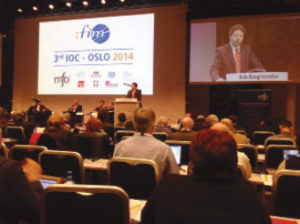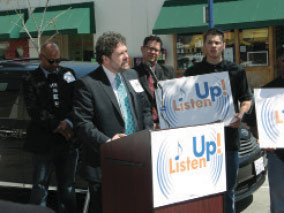by Barbara T. Owens, AFM International Representative, Midwest & Northeast and AFM Symphonic Services Division Negotiator
Theresa Naglieri began working for the AFM June 24, 1958. She was just a few days out of high school when she joined the steno pool. She has served six AFM International Secretary-Treasurers and two AFM International Presidents. Her retirement, in December 2014, marked the end of an era in the AFM’s history where staff adapted to the rapid advancements in technology, yet kept its personal touch.
Barbara T. Owens: How has the AFM changed in the last 50 years?
Theresa Naglieri: Technology has been the biggest change, and it affects everything we do. The AFM was in New Jersey until the 1970s, and we had three departments just to handle claims and charges involving the Federation: Inception, Pending, and Decisions. The AFM processed about 3,000 cases a year, and every week we would send out a large packet of cases to each board member for their review and vote. We also were responsible for collecting fines, and sometimes members made weekly payments, which we recorded on file cards. So there was a lot of paperwork!
BTO: What was the AFM office like?
TN: I’ve worked at three locations—New Jersey, 1500 Broadway, and 1501 Broadway. For a long time, we had a switchboard operator, and everyone worked in one large room. When I started with the AFM I used a manual typewriter, and it was a big change when I got an electric typewriter. I remember typing on 10 “onion skins” at a time; you didn’t want to make any mistakes because erasing took so long!
BTO: At that time there were also yearly AFM Conventions, weren’t there? How did you handle that without a computer?
TN: The conventions were every year until 1981, and the convention was held in a different location every year. We had note-takers who would write down everything that happened on the convention floor, and at the end of the day, a typist would type the complete proceedings. A local printer would be ready to typeset and print that day’s proceedings in time for distribution the following morning. There were no lunch breaks; if the president took a break he transferred the chair to the vice president, so administrative staff stayed on the job until it was completed.
BTO: You joined the AFM when James Caesar Petrillo was still president. Was he “larger than life”?
TN: I’ll tell you a funny story. Mr. Petrillo loved to be surrounded by people. One night he asked me to have dinner, and because the city wasn’t really safe at night, my brother-in-law said, “Call me when you get to dessert and I will come and pick you up.” We gave Mr. Petrillo a ride to Patsy’s, his favorite place. The next morning Mr. Petrillo came into the office with two bottles of “Joy” perfume, a very expensive perfume at the time, and gave one to me and sent one to my sister, even though it was my brother-in-law who gave us the ride!
BTO: I’m curious about your observations on the role of women in the AFM. For so many years the music business was a male-dominated industry …
TN: I liked every one of my bosses; they all treated me very well. The first female officer we had at the Federation was Florence Nelson. And of course, Tammy Kirk and Tina Morrison were elected to the IEB, but in many ways it’s still a “man’s world,” even though we have more women on the AFM staff now.
BTO: Are you a musician, Theresa? What kind of music do you like?
TN: I’m not a musician, but I love to listen to ballads and singers like Tony Bennett and Frank Sinatra.
BTO: Do you have a favorite memory or memorable AFM project?
TN: I was the coordinator for the Congress of Strings for over 20 years. Each participating local contributed $400 to sponsor an individual student for the eight-week program, and I was responsible for making up the orchestra based on the audition results. I also booked all the travel, and communicated with the conductors and teachers. Students who went through the program sometimes returned as masterclass teachers, and I liked seeing them return as adults. I attended a couple of concerts, and I enjoyed seeing the result of the work that we put into the program. It was a wonderful program!
BTO: What are your plans for retirement?
TN: My husband and I will spend part of the year in Florida. He is the cook in the family, but I think I might take some cooking lessons. I will miss everyone at the AFM; this job has been a lot of fun!
BTO: On behalf of everyone at the AFM, we love you and we wish you all the best on this new journey!





